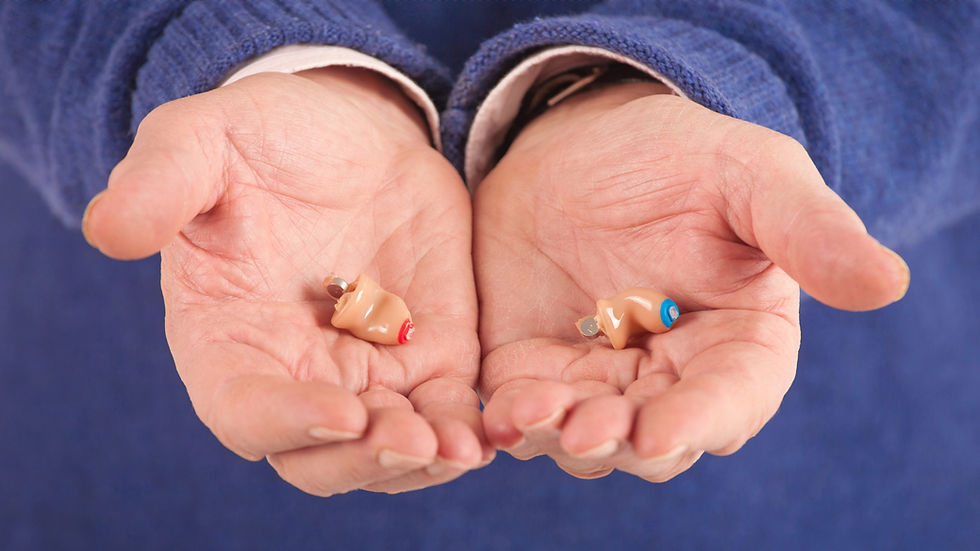Understanding Tinnitus: Causes and Treatment Options
- San Nimat
- Mar 13, 2025
- 3 min read
Updated: Apr 23, 2025

Have you ever experienced a persistent ringing or buzzing sound in your ears with no external source? If so, you might be dealing with tinnitus. Tinnitus affects millions of people worldwide and, while not a condition itself, it can be a sign of underlying hearing issues. At The Hearing World, we’ve helped many patients manage their tinnitus and improve their quality of life. In this guide, we’ll explore what tinnitus is, its common causes, and the most effective treatment options available.
What is Tinnitus?
Tinnitus is the perception of sound without any external source. It can manifest as ringing, buzzing, hissing, or even clicking sounds. For some, tinnitus comes and goes, while for others, it can be a persistent and disruptive experience. Many people assume that tinnitus is always linked to hearing loss, but this isn’t always the case—some individuals with normal hearing also experience tinnitus.
Common Causes of Tinnitus
Tinnitus can develop for various reasons, and identifying the underlying cause is key to finding the right management approach. Some of the most common causes include:

- Exposure to Loud Noise: Frequent exposure to loud environments, such as concerts, construction sites, or loud music through headphones, can damage the inner ear and lead to tinnitus.
- Age-Related Hearing Loss: As we age, the delicate hair cells in the inner ear naturally deteriorate, which can contribute to tinnitus.
- Earwax Blockage: A buildup of excessive earwax can lead to a temporary form of tinnitus by preventing sound waves from reaching the inner ear properly.
- Medications: Certain medications, including high doses of aspirin, some antibiotics, and anti-inflammatory drugs, have been known to cause or worsen tinnitus.
- Medical Conditions: Issues such as high blood pressure, temporomandibular joint (TMJ) disorders, and Meniere’s disease can all be linked to tinnitus.
- Head or Neck Injuries: Trauma from accidents, whiplash, or concussions can affect the auditory system and lead to tinnitus symptoms.
How Tinnitus Affects Daily Life
Many people with tinnitus struggle with concentration, sleep disturbances, and increased stress or anxiety. When left unmanaged, tinnitus can impact overall well-being and mental health. However, the good news is that several effective treatments can help reduce its impact.
Effective Treatment Options for Tinnitus
While there is no one-size-fits-all cure for tinnitus, various management strategies can help alleviate symptoms and improve comfort.

1. Hearing Aids
If tinnitus is accompanied by hearing loss, hearing aids can help amplify external sounds, making tinnitus less noticeable. Many modern hearing aids include built-in tinnitus masking features.
2. Sound Therapy
External sounds, such as white noise, nature sounds, or soft background music, can help mask tinnitus. White noise machines and smartphone apps are popular tools for this approach.
3. Cognitive Behavioural Therapy (CBT)
CBT is a structured therapy designed to change the way individuals respond to tinnitus, helping them manage the emotional distress associated with persistent ringing or buzzing.
4. Tinnitus Retraining Therapy (TRT)
This approach combines counselling and sound therapy to help individuals habituate to tinnitus, making
Lifestyle Modifications
Reducing caffeine and alcohol intake may help lessen tinnitus symptoms.
Stress management techniques, such as mindfulness, meditation, or deep breathing, can reduce tinnitus-related anxiety.
Staying active and maintaining good cardiovascular health can improve blood circulation, which may have a positive effect on tinnitus symptoms.
Medical Interventions: If tinnitus is linked to an underlying medical condition, treating that condition can sometimes provide relief. Seeking professional guidance is crucial in these cases.
When Should You Seek Help for Tinnitus? If tinnitus is affecting your daily life, interfering with your sleep, or becoming a source of distress, it’s time to seek professional support.




Comments